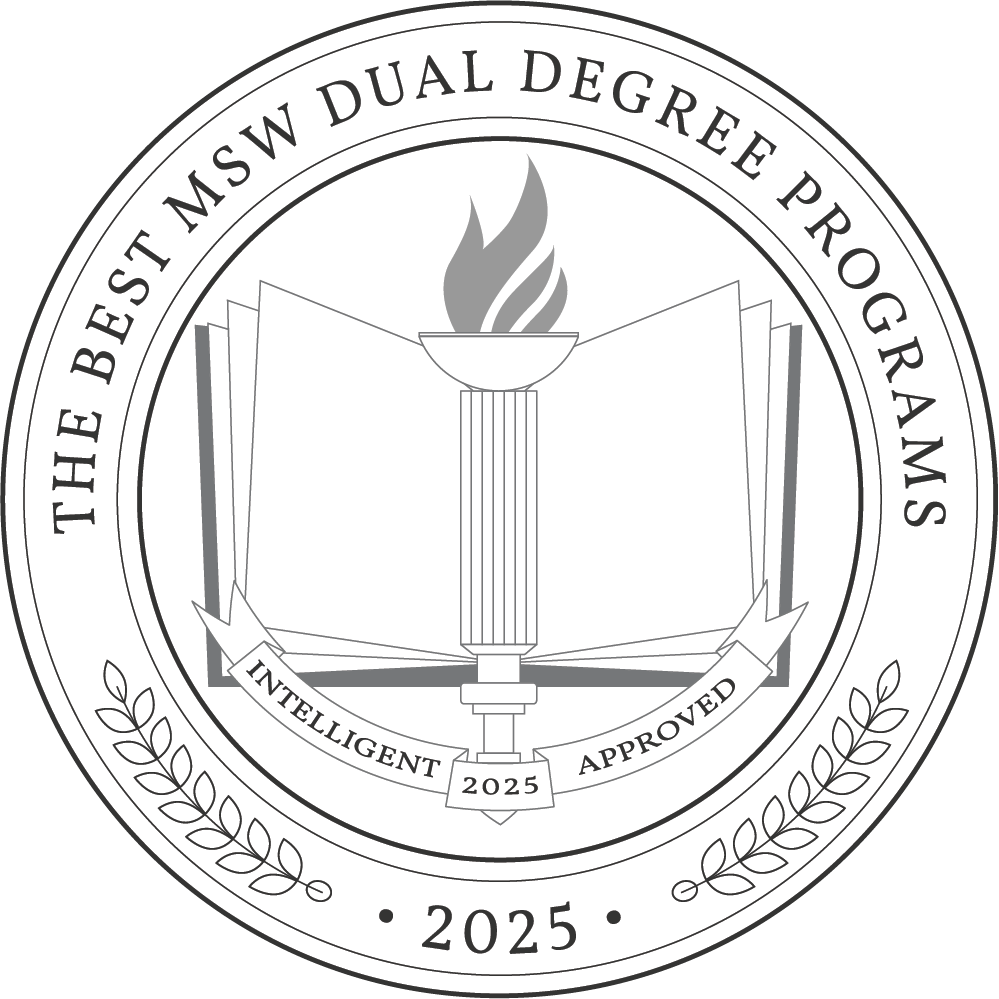An MSW dual degree may be the perfect fit for aspiring social workers looking to level up their career prospects. These programs are designed to cultivate a unique combination of skills ideal for interdisciplinary careers. Whether you’re interested in law, public health, business, theology, or criminal justice, an MSW dual degree provides expertise in social work and another field.
Graduates can pursue diverse careers, such as human rights attorneys (MSW/JD) with a median salary of $145,760, public health social workers (MSW/MPH) with a median salary of $62,640, or social and community service managers (MSW/MBA) with a median salary of $77,030.
While tuition will vary by program, the average cost of a graduate degree is $20,513 per year.
Why Trust Us
The Intelligent.com Higher Education Team is dedicated to providing students with independent, equitable school and program rankings and well-researched resources. Our expert-driven articles cover topics related to online colleges and programs, paying for school, and career outlooks. We use data from the U.S. Department of Education’s College Scorecard, the National Center for Education Statistics, and other reputable educational and professional organizations. Our academic advisory team reviews content and verifies accuracy throughout the year for the most current information. Partnerships do not influence rankings or editorial decisions.
- Analyzed over 2,000 national, accredited, and nonprofit colleges and universities
- 800+ rankings pages are reviewed and updated yearly
- Content is informed by reputable sources, surveys, and interviews with academic advisors and other experts
- Over 100 data points are reviewed for accuracy and quality throughout the year, including sources
How we rank schools
Our list features the best MSW Dual degree programs at top colleges nationwide. Each school featured is a nonprofit, accredited institution — either public or private — with a high standard of academic quality for post-secondary institutions.
We evaluated each school’s program on tuition costs, admission, retention and graduation rates, faculty, reputation, and the student resources provided for online students. We collected data from trusted sources like the National Center for Education Statistics, individual school and program websites, school admissions counselors, and other data sources. Then, we calculated the Intelligent Score on a scale of 0 to 100 based on the following criterion:
Academic Quality:
- Admission rate versus enrollment rate
- Retention rate of students who return after year one
- Accreditation status (regional and programmatic)
- Nonprofit status, both private and public institutions
Graduation Rate
- Overall graduation rate
- Total number of currently enrolled students, including diversity metrics
- Student-to-faculty ratio
Cost and ROI
- In-state and out-of-state per-credit tuition rates and fees
- Required credits to graduate
- Earning potential after graduation
- Availability of federal student loans, scholarships, and other financial aid options
Student Resources
- Available student services for online-only and hybrid programs
- On-campus amenities like tutoring centers and the number of libraries
Read more about our ranking methodology.
Best 34 Accredited MSW Dual Degree Programs
FiltersInstitution Type
Status
- Intelligent Score
- Alphabetically By University Name
- Acceptance Rate
- Enrollment
- In-state Graduate Tuition
- Out-of-state Graduate Tuition
- In-state Undergraduate Tuition
- Out-of-state Undergraduate Tuition

University of Pennsylvania
Intelligent Score: 97.86In-state: $53,166
Out-of-state: $53,166
In-state: $37,678
Out-of-state: $37,678
SAT: 1460-1570
ACT: 33-35
$2,402 - $2,448
On-Campus
Council on Social Work Education
60-128

University of California, Berkeley
Intelligent Score: 97.25In-state: $11,442
Out-of-state: $41,196
In-state: $11,442
Out-of-state: $11,442
SAT: 1310-1530
ACT: 30-35
$1,850
On-Campus
Council on Social Work Education
72-120

University of Washington School of Social Work
Intelligent Score: 96.16In-state: $10,629
Out-of-state: $37,998
In-state: $16,278
Out-of-state: $16,278
SAT: 1200-1453
ACT: 27-33
$912
On-Campus
Council on Social Work Education
115-142

University of North Carolina at Chapel Hill
Intelligent Score: 94.87In-state: $7,019
Out-of-state: $34,198
In-state: $10,552
Out-of-state: $10,552
SAT: 1280-1490
ACT: 28-33
Resident: $586
Non-Resident: $1,602
On-Campus
Council on Social Work Education
74-134

Boston University
Intelligent Score: 93.82In-state: $56,854
Out-of-state: $56,854
In-state: $56,854
Out-of-state: $56,854
SAT: 1310-1500
ACT: 30-34
$1,206
On-Campus
Council on Social Work Education
83-130

NYU Silver School of Social Work
Intelligent Score: 93.37In-state: $52,204
Out-of-state: $52,204
In-state: $34,704
Out-of-state: $34,704
SAT: 1370-1540
ACT: 31-34
$1,588
On-Campus
Council on Social Work Education
83-123

University of Denver
Intelligent Score: 92.86In-state: $52,596
Out-of-state: $52,596
In-state: $52,596
Out-of-state: $52,596
SAT: 1170-1360
ACT: 26-31
$1,164
On-Campus
Council on Social Work Education
87-146

Tulane University School of Social Work
Intelligent Score: 91.20In-state: $83,890
Out-of-state: $83,890
In-state: $50,674
Out-of-state: $50,674
SAT: 1370-1510
ACT: 31- 33
$1,276
On-Campus, Online
Council on Social Work Education
75-133

San Diego State University
Intelligent Score: 91.04In-state: $5,742
Out-of-state: $17,622
In-state: $7,176
Out-of-state: $7,176
SAT: 1090-1300
ACT: 22-29
Resident: $347
Non-Resident: $743
On-Campus
Council on Social Work Education
93

University of Maryland
Intelligent Score: 90.73In-state: $8,824
Out-of-state: $34,936
In-state: $13,158
Out-of-state: $13,158
SAT: 1270-1480
ACT: 30-34
Resident: $729
Non-Resident: $1,307
On-Campus
Council on Social Work Education
90-136

University of Utah
Intelligent Score: 90.57In-state: $7,412
Out-of-state: $26,017
In-state: $6,666
Out-of-state: $6,666
SAT: 1130-1350
ACT: 22-29
Resident: $301
Non-Resident: $1,058
On-Campus
Council on Social Work Education
81-126

Virginia Commonwealth University
Intelligent Score: 90.12In-state: $12,179
Out-of-state: $32,827
In-state: $12,703
Out-of-state: $12,703
SAT: 1060-1250
ACT: 21-28
Resident: $603
Non-Resident: $1,015
On-Campus
Council on Social Work Education
84

Fordham University
Intelligent Score: 88.32In-state: $54,730
Out-of-state: $54,730
In-state: $23,112
Out-of-state: $23,112
SAT: 1230-1410
ACT: 27-32
$1,045
On-Campus
Council on Social Work Education
99-145

University of Illinois at Chicago
Intelligent Score: 87.94In-state: $14,317
Out-of-state: $33,824
In-state: $15,016
Out-of-state: $15,016
SAT: 1200-1460
ACT: 27-33
In-State: $530
Out-of-State: $1,104
On-Campus
Council on Social Work Education
104

University of Georgia
Intelligent Score: 87.47In-state: $9,790
Out-of-state: $28,830
In-state: $8,878
Out-of-state: $8,878
SAT: 1250-1460
ACT: 29-33
In-State: $420
Out-of-State: $1,091
On-Campus
Council on Social Work Education
90-125

University of Houston
Intelligent Score: 87.17In-state: $8,449
Out-of-state: $20,665
In-state: $8,539
Out-of-state: $8,539
SAT: 1120-1310
ACT: 22-28
Resident: $474
Non-Resident: $994
On-Campus
Council on Social Work Education
90-141

University of South Carolina
Intelligent Score: 86.72In-state: $12,288
Out-of-state: $33,528
In-state: $13,737
Out-of-state: $13,737
SAT: 1140-1340
ACT: 25-31
Resident: $572
Non-Resident: $1,240
On-Campus
Council on Social Work Education
87-135

University of Louisville
Intelligent Score: 85.91In-state: $11,966
Out-of-state: $28,312
In-state: $13,260
Out-of-state: $13,260
SAT: 1050-1270
ACT: 21-28
Resident: $791 - $1,270
Non-Resident: $1,606 - $1,520
On-Campus
Council on Social Work Education
123
How to Choose an MSW Dual Degree Program
Choose your area of study
Choosing an area of study for this degree is a big decision, as it’ll affect your readiness for your future career. Consider asking yourself:
- What are my long-term career goals?
- What populations am I interested in serving?
- How do I want to make an impact?
For instance, those interested in legal advocacy and social justice might pursue an MSW/JD, ideal for roles in law or legal aid. An MSW/MPH suits students enthusiastic about community health and preventative care, preparing them for public health agencies. An MSW/MBA offers a combination of business and social work skills for leadership roles in non-profits.
Research schools and programs
Now that you have a discipline in mind, you can leverage this knowledge to conduct more thorough research on potential schools and programs. The following questions can help guide your research further:
- How does the curriculum support my professional interests?
- What is the faculty’s previous experience like, and how will that benefit my academic journey?
- What are the clinical hour requirements and opportunities for placements?
- What support services are available for dual degree students?
Most of this information will be readily available on school websites, but you’ll also benefit from speaking to an admissions counselor and attending an open house.
Prepare for tests and applications
Application and test prep can feel daunting, but with the right strategy, you’ll easily navigate this stage. Start by requesting letters of recommendation and transcripts to avoid unnecessary delays. Allow plenty of time to draft your personal statement, which should illustrate your unique story beyond test scores and grades.
Many of these programs require GRE scores, so consider enrolling in a test prep program to improve your performance. By simply planning ahead and dedicating time to each component, you can present a competitive application to admissions committees.
Select your program
The arrival of acceptance letters is always exciting, but it can quickly become overwhelming if you receive more than one. You can make this process easier by revisiting your initial research criteria and focusing on what matters most to you — like curriculum relevance, faculty you’re excited to learn from, and specialization availability.
This is also a great time to reassess the cost of attendance and compare it to financial aid offers, especially those offering scholarships, fellowships, or grants. To ultimately make the best choice, it’s crucial to consider the long-term return on your investment and how well each program aligns with your academic and career goals.
Determine how you’ll pay for your degree
For many students, earning a graduate degree while minimizing debt is a top priority. If you’re in a similar position, prioritize financial aid resources that actively reduce debt, like scholarships and grants, which don’t require repayment. If your program offers fellowships, be sure to apply to those that provide stipends or tuition assistance.
In instances involving financial gaps, opt for federal loans, which have lower interest rates and more flexible repayment options than private loans.
What Can You Expect From an MSW Dual Degree Program?
As a student in an MSW dual degree program, you can expect a comprehensive education that combines social work with another discipline specific to your career goals.
In an MSW/JD program, you’ll learn legal frameworks, policy advocacy, and social justice, preparing for legal aid or family law roles. MSW/MPH, another popular choice, combines public health and social work, focusing on community health, policy, and preventative care. Those who opt for an MSW/MBA can expect a curriculum that merges business acumen with social work, which is ideal for nonprofit leadership roles. Other options like MSW/Theology and MSW/Criminal Justice integrate spiritual care or criminology, preparing students for careers as chaplains or forensic social workers, respectively.
Graduation requirements typically include a thesis, 900 clinical hours or more, and coursework in both fields, ensuring a well-rounded and practical education.
Potential courses you’ll take in an MSW dual degree program
- Social Welfare Policy and Services: In this foundational course, students explore the development, implementation, and impact of social welfare policies. Lessons examine historical and contemporary social welfare programs and their effects on different populations.
- Advanced Clinical Social Work Practice: Another standard core requirement, this course covers advanced therapeutic techniques and interventions used in clinical settings. Students learn to assess, diagnose, and treat individuals, groups, and families with various mental health and behavioral issues.
- Integrative Seminar in Law and Social Work: Specifically for MSW/JD students, this course bridges the gap between legal principles and social work practice. Learners study legal advocacy, the role of social workers in the legal system, and how to navigate legal and ethical issues.
- Public Health and Social Work Practice: This course focuses on the intersection of public health and social work, making it ideal for MSW/MPH students. Participants learn about community health promotion, disease prevention, and the social determinants of health, preparing them to work in diverse settings.
- Organizational Leadership and Management: This course teaches management and leadership skills for MSW/MBA students. They will learn about organizational behavior, strategic planning, and financial management, equipping them to lead and manage non-profits and social service agencies.
MSW Dual Degree Frequently Asked Questions
How do I apply to an MSW dual degree program?
Many MSW dual degree programs have specific requirements for each discipline, but they often still share standard criteria — including:
- Bachelor’s degree from an accredited institution
- Minimum GPA, often 3.0 or higher
- Letters of recommendation
- Personal statement or essay
- Resume or CV
- Relevant work or volunteer experience
- GRE scores, if required
Don’t hesitate to contact an admissions counselor before applying. They can provide detailed information on specific requirements and advice, ultimately making your application more competitive.
How much does an MSW dual degree cost?
The average tuition for a graduate degree in the United States is $20,513 per year, but dual degrees may be more expensive due to additional coursework. Besides tuition, you should also budget for expenses like housing, course materials, and textbooks – as these costs can add up over time and ultimately make your education more expensive.
How long does it take to earn an MSW dual degree?
Obtaining an MSW dual degree takes about three to four years for full-time students and four to six years for part-time students, depending on the specific program and institution. The dual nature of this degree means additional coursework, which can extend the timeline. Be sure to double-check the total credit requirements, as these can vary by program and impact your completion timeline.

